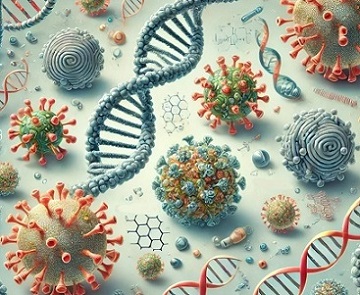Unveiling the Role of MicroRNA-374b in COVID-19 - A Hidden Battle Inside Our Blood Vessels
Nikhil Prasad Fact checked by:Thailand Medical News Team Jul 05, 2024 9 months, 2 weeks, 6 days, 21 hours, 38 minutes ago
COVID-19 News: COVID-19 has thrown the world into a whirlwind, causing millions of infections and altering the way we live. While most people know it as a respiratory disease, scientists have uncovered its impacts beyond the lungs, especially on our blood vessels. A recent study that is covered in this
COVID-19 News report, has highlighted the role of a tiny molecule called MicroRNA-374b (miR-374b) in the disease's progression, showing how it could be both a villain and a hero in our fight against COVID-19.
 Unveiling the Role of MicroRNA-374b in COVID-19 - A Hidden
Unveiling the Role of MicroRNA-374b in COVID-19 - A Hidden
Battle Inside Our Blood Vessels
Image -AI Generated
Understanding the Basics: What is MicroRNA-374b?
MicroRNAs (miRNAs) are small molecules in our cells that play a big role in regulating genes. Think of them as the conductors of a symphony, ensuring that each part of our genetic code is played at the right time and volume. MiR-374b is one such molecule that has caught the attention of researchers because of its significant changes during SARS-CoV-2 infection, the virus responsible for COVID-19.
The Connection Between COVID-19 and Endothelial Cells
Endothelial cells line our blood vessels, keeping them healthy and functioning. However, COVID-19 has been found to damage these cells, leading to a state known as endothelial dysfunction. This condition can cause blood clots, inflammation, and even multi-organ failure. The study in question aimed to understand how miR-374b interacts with these cells during infection.
The Study: What Researchers Did
Researchers from the Central University of Kerala-India and National Jewish Health in Denver- USA conducted a detailed study to decode the role of miR-374b in COVID-19. They stimulated human endothelial cells with SARS-CoV-2 proteins to mimic infection conditions. By analyzing the changes in these cells, they discovered that miR-374b levels dropped significantly, suggesting a disruption in its normal function.
Key Findings: miR-374b's Role in Endothelial Dysfunction
One of the standout discoveries was that miR-374b targets a gene known as c-FLIP, which is crucial in regulating cell death. Under normal conditions, miR-374b helps keep the balance, but during SARS-CoV-2 infection, the drop in miR-374b levels led to an increase in c-FLIP, promoting cell survival but also contributing to endothelial dysfunction.
The Double-Edged Sword: Survival and Dysfunction
While keeping cells alive might sound good, in the case of COVID-19, it's a double-edged sword. The survival of dysfunctional endothelial cells can lead to prolonged inflammation and fibrosis, worsening the patient's condition. This process is known as endothelial-to-mesenchymal transition (EndoMT), where the cells lose their original properties and gain new, harmful ones.
gt;
Potential Therapeutic Approaches
Understanding the miR-374b and c-FLIP interaction opens up new avenues for treatment. By targeting this pathway, it might be possible to restore the balance and improve endothelial function. This could potentially reduce the severe complications seen in COVID-19 patients, such as blood clots and organ damage.
Future Directions: More Research Needed
While the study sheds light on the complex interplay between miR-374b and endothelial cells, more research is needed to translate these findings into therapies. Clinical trials and further studies will be crucial in determining how we can manipulate miR-374b levels to benefit patients.
Conclusion: A Step Forward in Understanding COVID-19
The discovery of miR-374b's role in COVID-19 is a significant step forward in understanding the disease's underlying mechanisms. It highlights the importance of looking beyond the obvious and exploring the molecular battles happening inside our bodies. As we continue to unravel these mysteries, we move closer to finding effective treatments and ultimately, conquering COVID-19.
The study findings were published on a preprint server and are currently being peer reviewed.
https://www.biorxiv.org/content/10.1101/2024.05.22.595176v1
For the latest
COVID-19 News, keep on logging to Thailand Medical News.
Read Also:
https://www.thailandmedical.news/news/protein-c-a-potential-protector-against-covid-19-blood-clots
https://www.thailandmedical.news/news/cullin-5-cul5-complex-offers-new-hope-for-covid-19-treatment-by-disabling-orf9b-proteins
